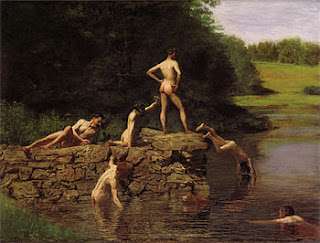Like Heidegger, Lawrence understands the essential task of poetry as safeguarding the mortal being of man in relation to the fourfold and, indeed, to all of those birds, beasts, flowers and silent objects which exist and unfold into being alongside us.
Thus, like Heidegger, Lawrence crucially relates the duty to safeguard Dasein to the question of language and thought, with the latter understood not merely as the manipulation of already existent ideas, but the welling up of unknown life into consciousness. Poetry might thus be defined as an act of attention and the attempt to discover a new world within the known world.
But this discovery of a new world involves an act of violence; the slitting of what he terms the 'Umbrella' and by which he refers to all that is erected between ourselves and the forever surging chaos of existence (our ideals, our conventions, and fixed forms of every description).
The poet is thus also a kind of terrorist; an enemy of human security and comfort.
But we needn't worry: for no matter how many times a poet manages to make a tiny hole in the painted underside of the Umbrella, the emergency services are on hand to ensure things are speedily repaired. The majority of us, if we're honest, prefer a patched-up reality and virtual chaos to the sheer intensity of lived experience.
And we prefer that poetry is annotated with notes that insist on the importance of form and technique, but discreetly remain silent about acts of vandalism and the mad desire for inhuman chaos.
But we needn't worry: for no matter how many times a poet manages to make a tiny hole in the painted underside of the Umbrella, the emergency services are on hand to ensure things are speedily repaired. The majority of us, if we're honest, prefer a patched-up reality and virtual chaos to the sheer intensity of lived experience.
And we prefer that poetry is annotated with notes that insist on the importance of form and technique, but discreetly remain silent about acts of vandalism and the mad desire for inhuman chaos.









